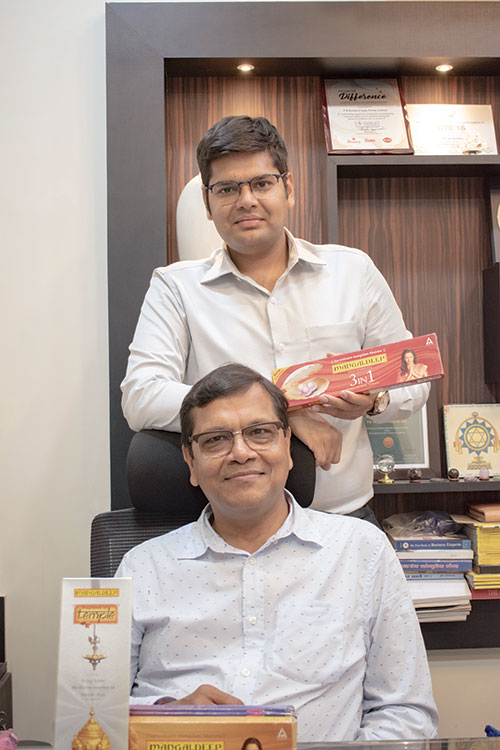
10 May ITC researches on health effects before launching products : Pawan Gupta
Apart from cigarettes, the multinational company ITC is also successfully working in the agarbatti industry. Kolkata based Payal Traders Pvt Ltd is a manufacturer of ITC Agarbattis in Eastern India. Pawan Kumar Gupta, Head of Payal Traders said in a conversation with ‘Sugandh India’ that before bringing any new incense sticks in the market, ITC researches on its aroma as well as its health related effects and then launches that product in the market. Other than incense sticks, Pawan Gupta, is originally into into the cashew business. On the question related to ITC incense sticks, he says that once he was approached by the stationery division of ITC in connection with the pencil business but before getting into it, he went to China for research. The conclusion of his research was that this business will not be successful as the raw material related to pencil in China is in abundance and cheap.

Wherein, the import duty in India is zero. In such a situation, there will be a loss in bringing a new product as it would be easier and cheaper to import pencils rather than manufacture them here. ITC was very pleased with the report and did not foray into pencils.
Pawan Gupta says that when ITC launched incense sticks, the company contacted him and his the business of incense sticks was started. Responding to a question, he said that he only manufactures incense sticks for ITC. All the products he manufactures are procured by ITC and so there is no scope for any other company. ITC provides a special quality and the fragrance is their secret. While some of the products are blended by us others are done by the company itself. Similarly, for the raw material, some are provided by us while some, the company provides. It is a kind of partnership business. ITC has around 36-37 incense stick brands.
On asking about the other manufacturers of incense sticks for ITC across the country, he said that there are more than 20 such manufacturers. Payal traders handles the eastern part of India covering Jharkhand, West Bengal, Orissa, Bihar and Assam.
On asking about the kind of products that are demanded in eastern India? Gupta said that the demand for cheap products is more here. One of our products is Anushree Agarbatti which offers more number of sticks at a cheaper cost. ITC has been providing best quality at best price.
Responding to a question, he said that the demand in eastern India is growing at the rate of 25-30 per cent. This is because earlier poverty prevailed in this area but now with the increase in income, there is more prosperity, so people are spending on things other than basic needs as well, but South and West India were already prosperous, so the market is fixed there.
On the demand for fragrance, he said that in West Bengal, higher quantity of incense stick is preferred. People burn bunch of incense sticks on the platform outside the temple. Although the traditional fragrances such as sandalwood, champa, rose, mogra are more liked, new experiments are also being done in incense sticks and they are being liked here as well. European fragrance was introduced here, but it was not liked much, because sandalwood and floral fragrances are in high demand in the market.
He said that like every other product, incense sticks also have a season. There are huge sales during festivals, but the months from November to March are quite a sluggish. But anyhow, incense sticks sell throughout the year.
On the shortage of workers in the agarbatti industry due to mechanization, he said that the role of machines has increased. Now labor intensive industries cannot run because mechanization has taken place. Earlier women used to work for 80-90 rupees. Now educated girls are running the machines. they are trained and work at a higher salary.
On asking about raw material, he said that the prices are definitely going up and one of the major reasons for this is due to the technical glitches. For example, there is an abundance of trees and forests here but still wood sawdust is brought from Vietnam. We have started making our own wood, sawdust , charcoal but jigat is an issues since government has banned its processing. The jigat is in abundance her as well but we import it as it being banned due to it being categorized as a forest produce. By planting a jigat tree, you cannot process it in the country. Similarly bamboo is a big issue, he said. The breed that is grown here is not as good also not the supply is not enough to counter the demand. So there is a huge shortage and for this it is necessary that bamboo seeds should be changed, because Indian bamboo is not good enough for incense stick industry. If agriculture experts and forest department work together, good bamboo can be produced.
Pawan Gupta told that in China, bamboo trees are ready in a year, whereas here it takes two-three years to grow a tree. Governments are not paying attention in this direction. The Tripura government had made an offer once, but fell silent on the quality of bamboo and the quality of the seed that it breeds. ITC has done bamboo plantation in 3000 acres, but we too have not been very successful. It is probably due to that the weather and soil of India is not conducive for good bamboo. Regarding the price and quality of bamboo from China and here, he said that there is a huge difference. One is able to produce around 150-200 gram of sticks from the imported 1 kg raw bamboo sticks whereas from the Indian bamboo, one is only able to produce 100 grams of sticks from 1 kg raw bamboo
In China, the by-products of bamboo are also fully used, whereas in India it sold at dirt cheap prices of is Rs. 3-4 a kg only for burning purposes. In China, it is used to make plastic wood and plates. Transport is also a huge problem in the North East. Therefore, the cost of bringing it from there is high. The specialty of Chinese bamboo is that the knots have a gap of 10 to 12 inches, while in Indian bamboo the gap is at 7-8 inches. That is why only Chinese bamboo works well with the machines. Indian bamboo can work in hand made incense sticks, but it is not effective in machines.




No Comments